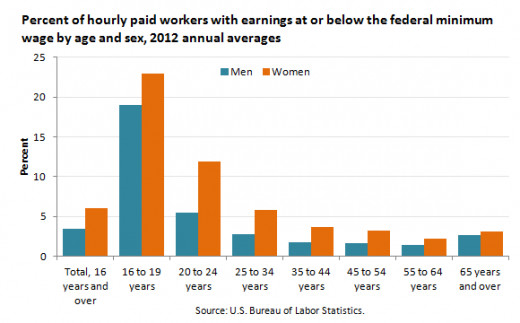Expect the Workplace Environment to Change for Women
Believe it or not, it is the century of the woman. Supported by the United Nations, and growing with the help of several grassroots organizations and advocates, women’s challenges have been on the forefront of headline news more now than ever before. Most magazines and online media outlets have also devoted a section exclusively to women’s challenges. Businesses large and small have also entered the fray, leading the cause for increased woman representation in top positions. The workplace environment is changing considerably as gender equality becomes increasingly an obligation and no longer a commodity. Unlike past campaigns, where women and the public at large were given lip service to the number of advantages available in the workplace, corporate directors have finally started to offer women these perks.
In addition to the hard work of these committed individuals, we now have the executive forces at work speaking up for the working woman. The Obama administration has been very vocal in ensuring that gender pay is becoming more a reality than just political abstract. At the judicial level, there have been some gains shadowed by potential future challenges. The good news is that there is just too much noise about women’s rights, which will eventually push for social and political pressure to guarantee real change.
Whether you are a woman in the workforce or preparing to enter it, or if you have daughters ready to dip a foot into corporate America, there are several ongoing campaigns that will change the climate for women.
-
Minimum wage increases – The Obama administration has been working tirelessly to raise the federal minimum wage rate. That attempt has not been successful so far, mainly because many conservatives have blocked its efforts. President Obama did manage to increase the wage of federal contractors to $10.10, while the rate for the private sector still remains at $7.25 an hour. Two positive repercussions will evolve from this move: first, it will later place pressure on elected leaders to push the minimum wage up for the sake of fairness. Why should federal employees be paid more than private workers? Second, many states have moved to increase their minimum wage rates within several years. This should place some pressure on conservatives to pass measures on the federal level to balance the wage rate nationwide. The best way to gauge this pay hike movement is to periodically visit the Department of Labor (http://www.dol.gov/) for updated news. A wage hike on the federal level will force those opposing states to raise theirs. An increase in minimum wage is important for women because Bureau of Labor statistics show that women are more likely to take those jobs at this level. Many of these women are poor, single mothers trying to raise a family on minimum wage.

-
Family and Medical Leave Act – Passed in 1993 by the Clinton administration, this act provides working mothers up to 12 weeks of unpaid leave to either have a child or adopt one, or care for a severely sick relative. The benefit is that although the time off is not compensated financially, covered employees do keep their health insurances. Several states have recently moved to pay workers during their time off, but that’s only three (New Jersey, Rhode Island, and California) out of 51, with other measures being taken at the legislative or research level to introduce paid time off. One setback is that federal law does not mandate paid time, so not every American professional will be covered. Another setback is that not every company is obligated to extend the FMLA to its workers, so that excludes an even greater amount of working moms. Most of this uncovered group falls under the poor working class, although the middle and working class are affected as well. The movement toward paid FMLA is important because it now has slowly pushed to include fathers as well, so having both parents at home supporting each other without worrying about the next paycheck will raise morale, reduce stress, and make the American workplace a more efficient and productive environment. To keep up with this campaign, visit the Department of Labor website at http://www.dol.gov/.
-
Paycheck Fairness Act – The first attempt passed to narrow the gap in gender pay was the Equal Pay Act passed in 1963 by President Kennedy. According to the Department of Labor, women were paid only 59 cents on the dollar compared to men during this period. Fifty-five years later, women are still being paid less, on average, than their male colleagues for the same work. The Paycheck Fairness Act of 2009, sponsored by then Senator Hillary Clinton, has been introduced as an extension of the former law to help reduce this continued disparity. It will accomplish this by pressuring companies to be more transparent with their wage decisions and allocations. As an added measure, the law prevents any company from penalizing employees for revealing their pay. Since its introduction, the bill has passed one branch of the legislature and rejected in the other. In April of 2014, the bill was blocked by Senate Republicans over interpretation of wording. Advocates have not given up though. There is a serious, understandably deliberate, push to pass this bill but the timing has not been right yet. With all the pressure being placed at all levels of the federal government, it is only a matter of time before it passes. To track its progress, visit the Govtrack.us website at https://www.govtrack.us/.
-
UPS vs. Mayer – Julie Mayer was a UPS driver in Long Island when she was relieved of her duties after requesting light duties. Mayer was pregnant at the time but was expected to carry large packages. She eventually lost her health insurance and incurred high out-of-pocket costs. The case is now sitting at the Supreme Court level, with the justices having to decide the extent of a company’s obligations in accommodating pregnant women. The Pregnancy Discrimination Act was passed in 1964 to protect women in the workplace. At issue here is whether UPS did enough under the PDA to accommodate Ms. Mayer. The company contends it provided her with the same accommodation as any other injured employee, and had released her only after they had honored the act. Mayer and her supporters accuse UPS of violating its obligations under the law and therefore had discriminated against Mayer. As the highest court in the nation, the final judgment will have great bearing on new laws and future cases. While many small business advocates are concerned about how this decision will affect its industry, protective laws mandated on the judicial level only require reasonable accommodations, taking into effect the size and revenues of a business to avoid undue burdens on any company.
How the workforce continues to evolve to support women’s rights and narrows the gender pay gap rely on these four campaigns. As noted, accommodating women is now everyone’s responsibility in every industry, and including the political and judicial levels. Gender equality has progressed at a historical perspective, but with more women holding professional jobs than men, how the workplace continues to support their rights and legitimate needs remains in great part to how these measures are finally settled.








